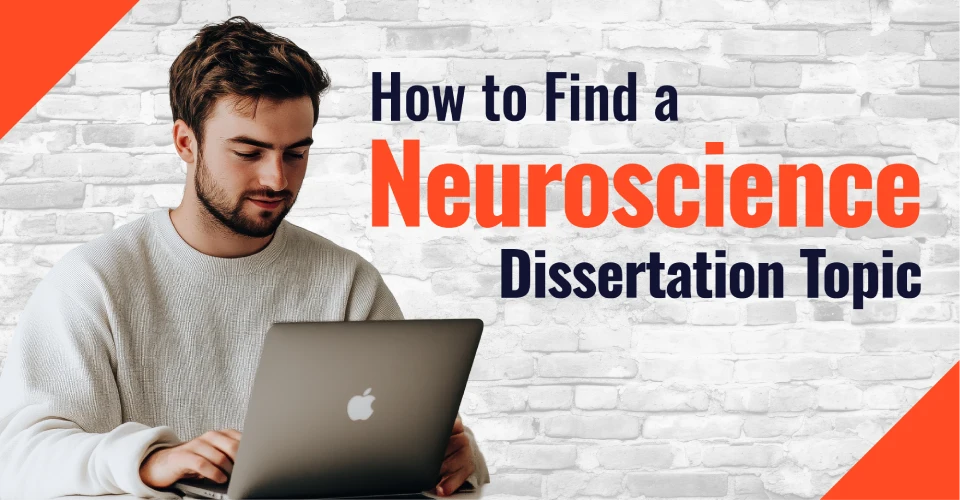
How to Find a Neuroscience Dissertation Topic
Summary: The selection of suitable neuroscience dissertation research topics can be challenging for students. Neuroscience spans a vast range of industrial fields that hinder the construction of a direct research question since its areas include brain science, cognitive analysis, computer intelligence and neurological genetics. Achieving research purposes effectively requires selecting the correct dissertation topic even when dealing with a wide selection of possibilities.
You will find a solution within the blog for selecting your dissertation topic in neuroscience. Following neuroscience dissertation success tips can help ensure that your chosen topic aligns with your interests, remains within your resource capabilities, and contributes new insights to the field.
Tips for Choosing a Neuroscience Dissertation Topic
Finding a topic for neuroscience dissertations may seem impossible, however, below are some pointers to help you how to choose a neuroscience research topic:
- Consider Your Passions–Select an area that interests you the most to help finish your research.
- Available Literature–Search for recent studies and articles to identify emerging topics that require further exploration.
- Evaluate Resources–Check whether you have the relevant data, equipment, and resources needed for your research.
- Ask Your Professors and Other Specialists–Get help from your advisor or other neuroscience field researchers as they may provide beneficial knowledge.
- Assess Long-Term Objectives–Choosing a topic that correlates with your career goals is beneficial.
- Multiple Topic Consideration–Question areas that are too broad and try to focus on one specific question that will enhance targeted research.
- Consider Ethical Restrictions and Constraints–Ensure there is a work balance between the time frame you provide for the study and whether the study can be conducted ethically.
- Search Other Fields of Study to Combine with Neuroscience–Think about marrying the fields of psychology, AI, or genetics to create a neuroscience topic.
Current Trends in Neuroscience Research for Dissertations
Neuroscience has a broad scope of information, and with each invention or development made, the understanding of the nervous system deepens. Below are some of the most trending topics in neuroscience research.
1. New Directions in Neuroimaging and Brain Mapping
The invention of more sophisticated neural disorders research ideas has greatly improved the investigation of particular brain regions. Functional imaging tools such as fMRI, PET, and DTI greatly enhance neural pathways and activity in the brain. Some key brain research dissertation themes include:
- Neuroscience connectomics and how areas of the brain work together.
- Neural Measurement of neurological functionalities including epilepsy, Alzheimer’s disease, and schizophrenia.
- Analyzing cognitive systems including memory and decision making by neural circuit mapping.
-
2. Advanced AI In Built Neuroscience Platforms And Services
AI in neuroscience has gained more recognition as more scientists can utilize tools that aid them in processing intricate neural data in less time. Adoption of AI-driven machine learning systems is taking place for:
- Forecasting the advancement of neurological diseases with neuroimaging and stratification by genetics.
- Creating assistive brain-computer interfaces (BCI) for the physically challenged.
- Augmenting cognitive neuroscience by modelling neural networks and brain activity.
3. The Contribution of Mental Health Studies For Neuroscience Research
Mental health research now constitutes a vibrant sub-field of neuroscience, encompassing the study of the biological underpinnings of various psychiatric illnesses. Some major developments are:
- Researching the role of neurotransmitter dysregulation in depression, anxiety and bipolar disorders.
- Assessing the impact of chronic stress and trauma on the brain’s morphology and physiology.
- Investigating novel treatment methods, including Psychedelic-Assisted Therapy, and intermodulation therapies such as transcranial magnetic stimulation (TMS).
4. Genes and Neuroscience
Developments in genomics help neuroscientists study genetic variation's impact on brain structure, function, cognitive skills, and neurological conditions. Current dissertation topic brainstorming for neuroscience research focuses on these areas:
- The search for the specific genes associated with some neurodegenerative diseases, such as Parkinson’s disease and Huntington’s disease.
- Exploration of the impact of epigenetic changes on brain plasticity and behaviour.
- The impact of gene therapy on neurological disorders.
>Steps to Narrow Down Your Neuroscience Dissertation Topic
Steps to narrow down your neuroscience dissertation idea ensure that your chosen topic is focused, attainable, and interesting. This is how you can do it.
Identify Your Broad Interest Area
Choose a topic that interests you. You may start with a general field, such as cognitive neuroscience, neurodegenerative diseases, or neurotechnology.
Review Recent Research and Trends
Read journals and articles to familiarize yourself with current academic debates, gaps, and emerging topics. Dissertations are also great sources of information for understanding recent trends.
Think Of The Methodology And Its Feasibility
Think of the tools, techniques, and data that you have at your disposal. What would be your approach? Will you run experiments or analyze pre-existing datasets?
Discuss With Your Supervisors Or Other Experts In The Area
Get suggestions from professors, researchers or mentors that may help pivot your area of discussion.
Determining Ethical And Practical Limitations Of The Study
You have to ensure that your study meets all ethical guidelines, resource availability as well as time constraints.
Establishing The Test Of Topic Relevance Anticipation
Self assess on the given area and consider:
- Is new knowledge generated?
- Is it doable in your time frame?
- Is it in line with your career objectives?
Draft a Research Proposal
Create a quick outline of your research question, objectives, and approach to assess whether it is well-structured and achievable. However, many students struggle with weak writing skills, making it difficult to present their research effectively. As a result, they often pay for dissertation assistance to ensure their thesis is completed on time, meets academic standards, and helps them achieve good marks.
Finding Inspiration for a Neuroscience Dissertation Idea
Choosing the correct neuroscience dissertation topic can be a task in itself, as it requires imagination and thorough knowledge of new trends. Here are some advanced neuroscience research methods for generating dissertation ideas:
- Studying relevant case and clinical research studies
- Participating in neuroscience meetings and conferences
- Reviewing recently published articles and papers
- Wondering and conversing with other researchers and scholars
Comprehensive guide to select Neuroscience Dissertation Topic
Writing a dissertation is difficult, especially when dealing with a complex topic like neuroscience, which includes a vast range of subtopics. Students often struggle to choose the best topic that is both easy to research and write about. In this section, we address these challenges and provide unique dissertation topics, discuss their importance and difficulties, and suggest resources to help you find ideas for your neuroscience dissertation.
Exploring Unique Neuroscience Dissertation Topics
Choosing neuroscience thesis topics for graduate students is important, as it enables you to present your understanding of the topic. Below are some captivating topics with short descriptions:
- The relationship between neuroplasticity and cognitive rehabilitation - Studying the Neuroplasticity research ideas involved when the head sustains an injury or develops a disorder and how the mind functions post-injury.
- Microbiota of the gut and its impact on brain activity - Studying the relationship between the bacteria in the stomach and mental health, cognitive skills, and behavioural functions.
- Artificial intelligence and Interdisciplinary neuroscience research topics - Research focuses on how models of the human brain can enhance computer science, machine learning, and AI.
- Brain processes when solving a problem creatively – Studying the neural correlates of imagination, innovation, critical thinking, and creativity.
Challenges in Selecting a Neuroscience Dissertation Topic
Finding appropriate functional neuroscience dissertation subjects can be a daunting task, as there is so much material to work with. Here are some of the common challenges students encounter:
- Overcoming information overload and narrowing focus - As there are so many available pieces of literature, it can prove challenging to appropriately frame the intended research.
- Considering ethical issues in neuroscience research–Every piece of research that involves human subjects or even animal subjects is governed by stringent ethical rules and regulations.
- Dealing with the challenges of data capture and composition–Most of the neuroscience research will require some sort of advanced imaging techniques and other sophisticated paraphernalia like electrophysiology, which entails a set of skills.
Resources for Researching Neuroscience Dissertation Ideas
The right resources aid in selecting a well-defined topic under neuroscience and dissertation ideas. One can source relevant information from multiple experts and platforms which are given in the table.
Academic Journals
Scientific journals and online databases–Sites such as Science Direct, PubMed, or Google Scholar host many peer-reviewed articles in neuroscience.
Neuroscience research platforms
Online platforms provide access to scientific papers and dissertations.
Example:PubMed, Google Scholar, ResearchGate, IEEE Xplore
Research archives or university libraries
Collections of past dissertations and theses for topic inspiration.
Example:MIT Libraries, Harvard DASH, ProQuest Dissertations & Theses
Professional Organizations
Communities of neuroscience researchers providing topic insights.
Example: Society for Neuroscience (SfN), Federation of European N
Importance of Selecting a Relevant Neuroscience Dissertation Theme
Choosing the appropriate neuroscience dissertation theme is imperative for accomplishing academic and professional objectives. The choice of topic should be prepared so that the research is related to the area of interest, important for the advancement of science, and useful in expanding professional opportunities.
- Advancing Scientific Knowledge–Brain research dissertation themes are relevant dissertation themes of this nature and will help in addressing the problems neuroscience could not resolve.
- Economic and Educational Development–Picking a theme that corresponds with your area of interest raises the likelihood of improvement and comes in handy whilst planning future employment endeavours.
- Social Development and Clinical Benefits–There are far-reaching ramifications of biology, technology, and psychology. A suitable dissertation theme can lead to easier treatment for mental illness or even the invention of novel neural devices.
When students choose relevant and significant neuroscience dissertation themes, they contribute to the field and prepare themselves for further exploration of cutting-edge neuroscience research topics and professional endeavours.
Summary
Choosing an appropriate neuroscience dissertation topic requires quite a bit of effort, such as researching ongoing studies, identifying areas that need more exploration, and figuring out how to combine all of that with personal interests. Further, reviewing published literature, obtaining feedback from thesis advisors, and even considering interdisciplinary collaborations can help hone in on a topic. Focus on impact, scope, and relevance to existing research. Getting any of these components wrong means selecting an ill-fitted topic and hence not being able to make any meaningful contributions to the field.
